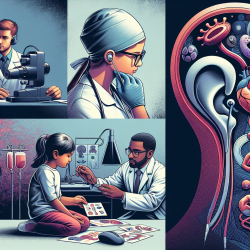Introduction
In the field of pediatric audiology and speech-language pathology, understanding the nuances of hearing loss in children with complex medical histories is crucial. A recent study titled "Hearing loss in patients with mucopolysaccharidoses I and VI after hematopoietic cell transplantation: A longitudinal analysis" provides valuable insights into the progression of hearing loss in patients with mucopolysaccharidoses (MPS) post-hematopoietic cell transplantation (HCT). This blog aims to distill the findings of this study and offer practical advice for practitioners to enhance their clinical skills and encourage further research.
Key Findings from the Study
The study conducted by van den Broek et al. (2020) followed MPS patients who underwent HCT between 2003 and 2018. Key findings include:
- Improvement in Air Conduction Thresholds: The study observed a significant improvement in air conduction thresholds over time, with pure tone audiometry (PTA) results showing a decrease from 50±0.7 dB one year post-HCT to 23±11 dB 13 years post-HCT (P < .001).
- Worsening of Bone Conduction Thresholds: Conversely, bone conduction thresholds worsened slightly, indicating the complexity of hearing loss types in these patients.
- Evolution of Hearing Loss Type: Initially, the hearing loss was predominantly conductive, shifting to sensorineural over time. This highlights the need for continuous monitoring and tailored interventions.
Clinical Implications
For practitioners working with children who have undergone HCT, these findings underscore the importance of regular audiological evaluations. Here are some actionable steps:
- Annual Audiological Assessments: Implement routine yearly assessments to track changes in hearing thresholds and adjust intervention strategies accordingly.
- Early Intervention: Given the shift from conductive to sensorineural hearing loss, early intervention can help mitigate the impact on speech and language development.
- Multidisciplinary Approach: Collaborate with otolaryngologists, audiologists, and speech-language pathologists to develop comprehensive care plans that address both medical and communicative needs.
Encouraging Further Research
While this study provides a solid foundation, it also opens avenues for further research. Practitioners are encouraged to explore:
- Long-term Outcomes: Investigate the long-term impact of sensorineural hearing loss on academic and social development in MPS patients.
- Innovative Interventions: Develop and test new therapeutic interventions that can address the unique audiological needs of this population.
Conclusion
Understanding the progression of hearing loss in MPS patients post-HCT is essential for improving their quality of life. By integrating the findings of this study into clinical practice, practitioners can make data-driven decisions that enhance outcomes for children. To read the original research paper, please follow this link: Hearing loss in patients with mucopolysaccharidoses I and VI after hematopoietic cell transplantation: A longitudinal analysis.










